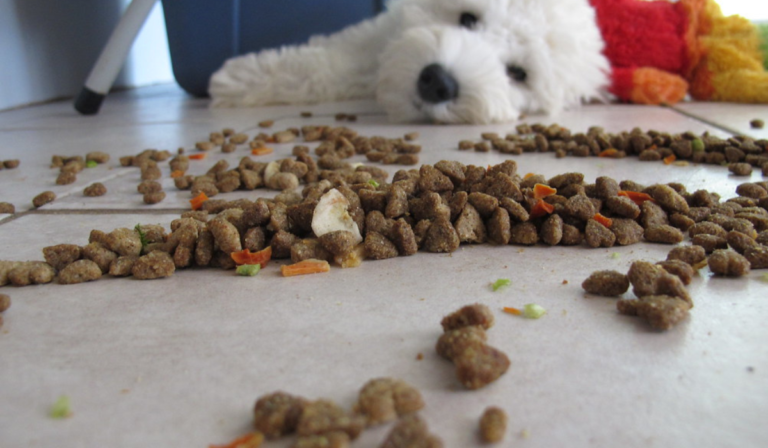If you’ve ever been in the frustrating situation where your dog refuses to eat their regular food but will happily devour treats, you’re not alone. Many pet owners face this issue, and it often leaves them worried about their dog’s health. If you’ve been asking yourself, “Why is my dog not eating his food but will eat treats?” here are nine common reasons and solutions to help get your dog back on track.
1. Your Dog Might Be a Picky Eater
Sometimes, dogs can become picky eaters, preferring treats over their regular meals. Just like us, dogs have preferences for certain tastes and textures, and they might simply not like the food you’re offering.
How to Handle Picky Eating:
- Mix wet food with dry kibble to enhance the flavor.
- Try a different brand or flavor of food.
- Warm up their food to increase the aroma.
2. Stress and Anxiety Can Affect Their Appetite
Dogs are sensitive to their environment, and changes such as a new pet, move, or even loud noises can make them anxious, causing them to refuse regular food. Treats, however, are often viewed as rewards, making them more tempting during stressful times.
Signs of Stress in Dogs:
- Excessive panting, pacing, or licking
- Hiding or avoiding people
- Vomiting or diarrhea
Try to reduce the stressors in your dog’s environment and provide a calm, predictable routine.
3. Health Problems Could Be the Culprit
When a dog stops eating their food but continues to eat treats, it might be a sign of a health problem, such as dental issues or gastrointestinal discomfort. These conditions can make eating regular food painful or uncomfortable.
Signs of Illness:
- Vomiting, diarrhea, or constipation
- Lethargy and lack of energy
- Changes in behavior or appetite
If your dog is showing signs of illness, a trip to the vet is essential.
4. Dental Issues Are Making It Difficult to Eat
Dental problems, such as gum disease, broken teeth, or infections, can make chewing regular food painful. Since treats tend to be softer, your dog might be able to eat those without difficulty but avoid their regular meals.
What to Look For:
- Bad breath or swollen gums
- Difficulty chewing or drooling
- Missing teeth or broken teeth
If you notice any dental issues, consult your vet for a checkup.
5. Boredom with Their Food
Dogs can get bored with eating the same food every day. Treats, which come in different flavors and textures, might be more exciting than their usual meals.
How to Add Variety:
- Rotate between different flavors and brands of food.
- Add fruits and vegetables (like carrots or sweet potatoes) to their meals.
- Use dog-friendly toppers or broths to make meals more appealing.
6. Your Dog May Be Manipulating You
Dogs are intelligent and quickly learn how to get what they want. If your dog knows that refusing regular food means they’ll get treats, they might be using this tactic to manipulate you.
Setting Boundaries:
- Stick to a feeding schedule and avoid giving treats between meals.
- Remove uneaten food after 15-20 minutes.
- Be consistent and firm with your approach.
7. Changes in Routine Can Disrupt Their Eating Habits
Dogs thrive on routine, and a change in feeding times or other parts of their schedule can affect their eating habits. A disruption in their routine may lead to a lack of interest in their regular food.
How to Adjust to Routine Changes:
- Gradually introduce changes to feeding times.
- Keep other aspects of your dog’s routine as consistent as possible.
- Patience is key, and eventually, they should adapt to the new schedule.
8. Your Dog’s Food Might Be Spoiled
Dogs have a superior sense of smell and can detect when food has gone bad. If your dog refuses to eat their food but continues eating treats, it could be because the food is spoiled or expired.
How to Ensure Freshness:
- Always check the expiration date on dog food packages.
- Store dog food in a cool, dry place away from heat and moisture.
- If the food seems spoiled, replace it with a fresh batch.
9. They Might Have Food Allergies or Sensitivities
Food allergies or sensitivities could make your dog avoid regular meals. Some ingredients in dog food might upset their stomach, leading to a refusal to eat, while treats could contain different ingredients that don’t cause any issues.
Signs of Food Sensitivities:
- Vomiting, diarrhea, or stomach discomfort
- Itchy skin or ear infections
- Unexplained weight loss
If you suspect food allergies, consult with your vet. They may recommend a hypoallergenic diet or specific food trial to identify the problem.
Summary: Finding the Solution
If your dog is eating treats but refusing their regular food, there could be a variety of reasons behind it. Whether it’s picky eating, stress, health issues, or boredom with their food, identifying the cause is the first step toward solving the problem. Remember to consult your vet if you’re unsure or if the issue persists, especially if your dog shows signs of illness.
By understanding your dog’s behavior and offering the right solutions, you can help ensure that your furry friend stays healthy, happy, and well-fed.
Our agency Paidguestpost.net offers guest posting opportunities across nearly all niches. If you’re looking to boost your website’s ranking and traffic, consider utilizing our guest post services.
